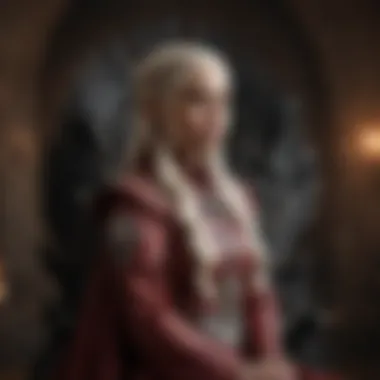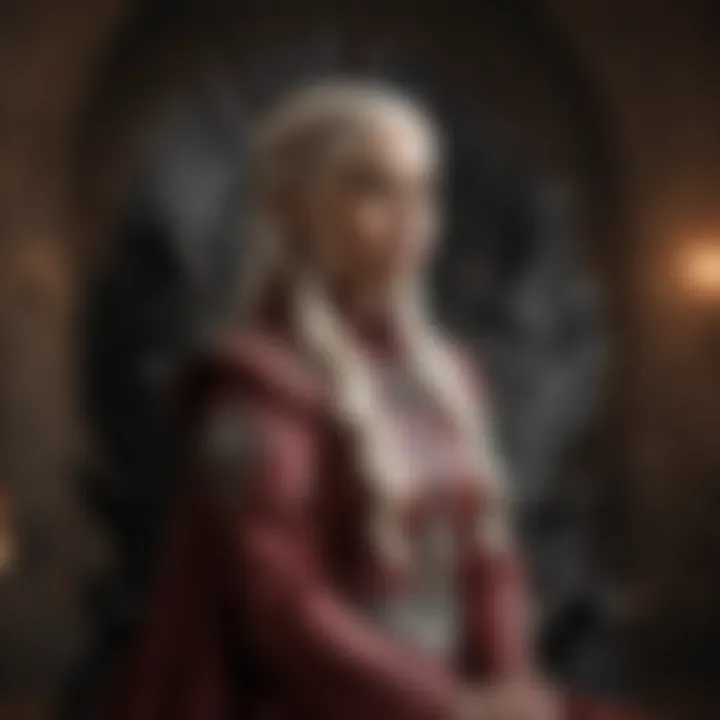Exploring Daenerys Targaryen: The Evolution of the Dragon Queen


Intro
In the complex and often perilous world of Game of Thrones, few characters have captivated audiences quite like Daenerys Targaryen. As the last scion of the Targaryen dynasty, her journey from a timid young woman desiring acceptance to the powerful Dragon Queen is nothing short of transformative. This analysis seeks to peel back the layers of her character, illustrating not just her evolution but also how her decisions ripple through the fabric of Westeros.
Daenerys embodies the struggle for power and identity in a realm steeped in political intrigue and familial betrayal. Her story is a multi-faceted examination of leadership, morality, and the weight of legacy. While many view her as a liberator, others see her downfall as a tragic warning against unbridled ambition.
The exploration starts with her character dissection, moves into significant episode breakdowns, traverses the rich lore of Westeros, and even dips into popular fan theories. Through engaging narrative and careful analysis, readers will not just comprehend Dany's actions but also perceive the profound implications they carry within the overarching storyline.
With that in mind, let's dive deeper into the character of Daenerys Targaryen, understanding her nuances and the forces at play that shaped her into the formidable figure she became.
Prelude to Daenerys Targaryen
Daenerys Targaryen stands as one of the pivotal characters in the Game of Thrones saga, embodying themes of power, ambition, and moral complexity. Her journey from a timid girl in exile to a formidable leader captures the fascination of many fans. In understanding Daenerys, one captures not just the essence of a character, but also the echoes of history and legend that the Targaryen family represents. This section serves to illuminate her role, focusing on significant aspects of her character and the profound impact of her legacy.
Overview of the Character
Daenerys, often referred to as the Mother of Dragons, starts her narrative as a vulnerable young woman defined largely by the actions of those around her. Initially seen as a pawn in her brother Viserys's quest to reclaim the throne, her character gradually transforms through her experiences across continents. She confronts adversity, discovers her own strengths, and embraces the weight of her family's legacy.
Her character is marked by a strong moral compass, though as events unfold, this sense of justice becomes increasingly layered. Daenerys's development is not linear; it oscillates between idealism and pragmatism. Her decisions often reflect the external pressures she faces, raising questions about the nature of leadership and the sacrifices that accompany the pursuit of power. The journey of Daenerys is, at its core, a exploration of identity against the backdrop of a treacherous political landscape.
The Significance of the Targaryen Legacy
The Targaryen name carries with it a weight of expectation and history, entwined with dragons, fire, and blood. The very mention of Targaryens evokes images of powerful rulers who once dominated Westeros. Daenerys's connection to this lineage profoundly shapes her motivations and identity.
Understanding the significance of this legacy allows a closer look at how Daenerys grapples with it throughout her journey. She's not just fighting for her own recognition; she aims to restore her family's former glory. It’s a journey peppered with both honor and the potential for hubris. The legacy of the Targaryens is also a dual-edged sword, with the ancestral ghosts haunting her decisions, pushing her towards greatness while also warning of downfall.
“Fire and blood,” the Targaryen motto resonates deeply in Daenerys's psyche, shaping her into both a liberator and a conqueror.
This dichotomy between salvation and destruction plays out vividly throughout her narrative arc and begs the inquiry of what it truly means to lead. Daenerys embodies the struggle of inherited legacies, continually challenged by her desire to do good while navigating a landscape rife with betrayal and moral ambiguity. Her connection to the Targaryen past is thus not merely superficial; it is vital to her understanding of power and the ethical implications of wielding it.
As the analysis progresses, each element of Daenerys’s story will unfold to reveal the intricate layers that define the Dragon Queen, offering readers a nuanced perspective of one of the most complex characters in Game of Thrones.
Early Life in Exile
Daenerys Targaryen’s early life is a somber tapestry woven with threads of fear, instability, and aspirations shaped by the specter of her family’s fall from grace. It plays a crucial role in informing her character later in the story, setting the stage for her tumultuous rise to power. Born in the wake of a violent coup that decimated the Targaryens, Daenerys lived her childhood far from the opulent halls of Westeros, under the continual threat of discovery and assassination. This background imbued her with a sense of vulnerability and isolation, which would inform her relationships and decisions as she navigated the treacherous waters of leadership.
Childhood in the Shadow of Aegon
Daenerys, often simply called Dany, was born the youngest child of King Aerys II Targaryen, the so-called Mad King. From the moment she entered this world, her fate was intertwined with the legacy of Aegon, the initial conqueror of Westeros. Growing up, she learned about her brother’s namesake, and this instilled in her a yearning to reclaim her family's lost glory.
Her early existence revolved around her elder brother, Viserys, who constantly reminded her of their family's heritage. Yet, he was also a product of their exile, spurring jealousy and a desire for power, which he projected onto an impressionable Dany. She observed how he oscillated between vulnerability and anger—a reflection of their precarious situation. This constant tug of war shaped her perspective on strength and power, with profound implications on the decisions she made later.
- Key influences on Dany's self-perception:
- Constant reminders of her family's former power
- Her brother's ambitions and how they shaped her identity
- The inherent dangers of exile, which forged her resilience
Ultimately, growing up in the shadow of Aegon taught Daenerys not only about the might of the Targaryen name but also the harsh realities one faces when stripped of it. This foundational understanding of loss and aspiration becomes increasingly significant as she strives to reclaim the Iron Throne.
Influences of Viserys Targaryen
The relationship between Daenerys and her brother Viserys is essential in understanding her development. Viserys, warped by their shared trauma, often treated Dany as a means to an end. His perception of her as a paw for his ambitions was shaped by his own rancor and desperation. He saw her as the key to restoring their family’s dynasty, essentially training her to view her femininity as a commodity to be traded for power.
Viserys' toxic influence can’t be overstated. It molded her understanding of loyalty and betrayal. Ironically, while he sought to control her, he inadvertently instilled in her a fierce motivation to carve her own path—one that often diverged from his suffocating expectations. Dany's initial submission to his will gradually gave way to a darker resolve, as she learned to harness the power that lay dormant within her.
"The dragon does not concern itself with the opinion of sheep."
Through her brother, Daenerys experienced the complex interplay of power dynamics, often marked by illusion and coercion. This inherent tension well equipped her to navigate the formidable challenges that awaited her once she stepped out of her brother's shadow and into her own light.
In sum, Daenerys Targaryen’s early life reflects a crucible of adversity and ambition, an intricate formation that would shape her into one of the more compelling figures in the Game of Thrones narrative.
The Rise to Power


In the complex tapestry of Game of Thrones, Daenerys Targaryen's ascent to power is a crucial thread that intertwines with the theme of ambition, identity, and legacy. Her journey from a frightened girl to the proclaimed Dragon Queen serves not just as a narrative of personal growth but as a commentary on the nature of power and its potential to corrupt. This section highlights the pivotal moments and relationships that shape her rise, principally the bond with Khal Drogo and the transformative moment of dragon births.
The Role of Khal Drogo
Khal Drogo plays a fundamental role in Daenerys' rise to power. Marrying Drogo is, for Daenerys, a leap from a life of fear and exile to the lap of a fierce warrior who commands respect. Initially, she is a pawn in her brother's games, but through her marriage, she finds both strength and independence. Drogo is not just a formidable leader; he represents the warrior culture that Daenerys must embrace to thrive.
Their relationship evolves from a mere alliance into a deep partnership built on mutual respect. Through Drogo, she learns to harness her own power and recognize her own agency. By leading his troops and immersing herself in the Dothraki lifestyle, Daenerys sheds the timid girl she once was, transforming into a figure of command. This change is encapsulated in her actions following Drogo’s death, where she ignites the flames of her destiny.
"The fire is a part of me, not just a tool to use."
In losing Drogo, Daenerys also gains the courage to embrace her destiny, igniting her ambition to reclaim the throne of her ancestors. His influence is instrumental in shaping her tactics and aspirations, as she moves from being a passive observer to an active player in the game of thrones. Her marriage to him is marked not just by passion, but with the realizing of potential in the chaos of war.
Birth of the Dragons
The birth of the dragons marks a seismic shift in Daenerys’ trajectory, signifying a rebirth of sorts—not only for her but for the Targaryen line. The hatching of the dragons is symbolic; it represents a merging of myth and reality, where Daenerys’s identity is irrevocably altered. Once she witnesses the spectacle, she holds the ultimate power over life and death, a stark contrast to her earlier depiction as a victim.
With the dragons, Daenerys transforms from a fledgling leader into a formidable force. She commands the respect of those around her and uses the dragons as not merely pets but as powerful assets in her quest for dominion. They enhance her claims to the Iron Throne, giving her the power that was once stripped away. Dragons, which became a cornerstone of Targaryen identity, ignite the flames of her ambition and empower her in the face of adversity.
In establishing her rule, Daenerys leverages the dragons not just in battle, but as a unifying symbol of her rightful claim. This control over the dragons can be seen as a rich metaphor for her own growth—where once she was dictated by others, she now becomes a figure that others must reckon with.
In summary, the potpourri of influences surrounding Daenerys’ rise reveals how her becoming is layered in relationships and pivotal events. The duality of her journey—from dependence on Khal Drogo to harnessing the power of dragons—demonstrates the evolution of a character who aspires not just to reclaim a throne, but to redefine power itself.
Establishing Her Rule
Establishing her authority is a critical point in Daenerys Targaryen's journey. Her ascent from the shadows of her family's disgraceful past to becoming a ruler in her own right is layered with intricate motivations and choices. This phase showcases not just her ambition, but also her evolving understanding of leadership and justice. As she navigates through this tumultuous process, the story delves into how her identity interlaces with her decisions, affecting both herself and those who follow her.
Conquests in Essos
Daenerys's conquests in Essos are pivotal in her quest for power. The various cities she encounters are not simply locations on a map but symbols of her evolving ideals. For instance, when she conquers Astapor, she does not just gain a new base of power; she also acquires the Unsullied, fierce soldiers who embody her newfound strength.
Her approach to these conquests varies widely, highlighting her unique philosophy of leadership. She aims to liberate rather than conquer. This distinction is crucial. Whenever she captures a city, her intent is to free the oppressed rather than rule through fear. Her battle for Yunkai is particularly illustrative of this. Daenerys strives to provide the enslaved people with a sense of agency. This approach complicates her authority – she is revered by some, but also seen as a threat by others.
In each conquest, the consequences of her decisions ripple through the region, impacting alliances, creating enemies, and ultimately shaping her legacy. She learns difficult lessons about power dynamics; her method of governance often clashes with the traditional expectations of a ruler, which can lead to unforeseen turmoil. It is through these actions that Daenerys begins to define the kind of queen she aspires to be, igniting debates about justice and morality.
The Concept of Justice
Justice is a recurring theme that surfaces throughout Daenerys's reign. The idea of what justice means to her evolves sharply. Early on, she sees justice in terms of liberation. She envisions a world where the oppressed rise against their oppressors, evidenced in her famous quote, "I will take what is mine, with fire and blood." This juxtaposition of fire—symbolizing destruction—and blood—representing sacrifice—stirs the narrative, creating tension between her noble aspirations and the brutal methods she sometimes employs.
As her rule solidifies, this once-clear definition of justice becomes muddled. The emergence of her dragons poses ethical questions; does the end justify the means? The key events leading to the downfall of Kings Landing illustrate this conflict. As she becomes more engrossed in her quest for power, her moral compass seems to falter, demonstrating that justice can morph into vengeance when unchecked ambition takes precedence.
"There's a thin line between justice and revenge, and Daenerys's journey reveals how easily one can slip into the other."
In contemplating the nature of justice, Daenerys reflects the broader complexities of leadership. Her struggle serves as a reminder that the line between the just ruler and a tyrant can often blur in the quest for power. This internal conflict resonates with audiences, prompting them to reflect on their own beliefs about justice in leadership.
Ultimately, Daenerys's rule—marked by conquests and moral dilemmas—beckons readers to question how authority should be exercised and the profound implications of one's decisions in the pursuit of power.
Interactions with Key Figures
Daenerys Targaryen’s journey through Game of Thrones is not merely defined by her actions alone. Her interactions with key figures throughout the series shape and influence her development, ideology, and the path she ultimately chooses. These relationships serve as the backbone of her narrative, providing contrasting perspectives and opportunities for growth. Highlighting Daenerys' connections with figures such as Tyrion Lannister and Jon Snow showcases the complicated nature of her quest for power. These bonds underline the themes of loyalty, betrayal, and morality that permeate her character arc and reflect the broader struggles within the realm.
Tyrion Lannister's Influence
One of the most significant alliances Daenerys forges is with Tyrion Lannister. Initially, she seems skeptical, a sentiment rooted in her family's long-standing animosity towards the Lannisters. However, Tyrion's brilliant mind and acute political intuition can't be overlooked.
As her advisor, Tyrion becomes instrumental in shaping her approach to rulership. His counsel often balances her emotional impulses, urging her to ponder the consequences of her decisions thoroughly:
- Pragmatism over Idealism: He consistently reminds her that the path to power must be traversed carefully, balancing her ideals with the harsh realities of leadership.
- Morality Check: Tyrion often poses critical moral questions that challenge her perceptions of justice and rightful rule. This deliberation could be pivotal, as it prompts her to grapple with the implications of her quest for power.
In moments of tension, Tyrion remains a voice of reason, attempting to steer her away from tyrannical decisions that could mirror those of her forebears. Their dynamic illustrates the intricate nature of power—how one may wield it with compassion or devastate entire kingdoms. It's worth noting that Tyrion’s influence offers Daenerys a view of leadership that values diplomacy over sheer force.
"When you have to kill, kill. But only after you’ve tried everything else."
This kind of wisdom, although often unheeded, plants seeds of doubt about her methods, possibly defining the essence of her rule.


Her Relationship with Jon Snow
Daenerys's connection with Jon Snow represents another critical arc in her story, intertwining themes of love, loyalty, and power. Initially, their relationship blossoms with mutual respect and admiration, which is extraordinary in a world fraught with political machinations. They both bear the weight of their legacies yet find common ground in their shared battles against tyranny.
However, as their bond deepens, it becomes a source of tension. Jon's revelation as Aegon Targaryen complicates their relationship and sets the stage for ideological conflict:
- Legacy Of Power: Jon’s lineage poses a fundamental challenge to Daenerys’s claim to the Iron Throne. The mere existence of a legitimate rival both deepens her insecurities and volatile ambitions.
- Divergent Ideals: This struggle is not just about the throne but also about their differing views on power. While Daenerys equates power with a right to rule, Jon embodies the moral compass, often prioritizing the well-being of people over political power.
As their relationship deteriorates, it becomes apparent that love is not a safeguard against the desires for power and legacy. This narrative evolution adds layers to their characters, showcasing how even bonds forged in respect can lead to tragic misunderstandings and, ultimately, downfall.
In sum, the interactions Daenerys cultivates with figures like Tyrion and Jon cultivate a rich tapestry of conflict, love, and ambition. They reveal the multifaceted nature of her character while emphasizing the series' exploration of power dynamics and human relationships.
Ideological Conflicts
The ideological conflicts in Game of Thrones constitute a crucial layer of the story, shaping the characters' motivations and the overall narrative. Daenerys Targaryen stands at the crossroads of these conflicts, wrestling with the broad themes of power, morality, and freedom. Her journey highlights the challenges leaders face when balancing their ideals against the harsh realities of political life.
The Balance of Power and Morality
Daenerys' quest for power poses significant questions about morality. Her initial motivations are rooted in a desire to free the oppressed and end tyranny. However, as she accumulates power, the methods she employs begin to blur the lines between just and unjust. This creates a moral quandary, not just for her but for those who follow her.
When Daenerys orders the execution of her enemies, she justifies her actions as necessary for the greater good. Yet, with each decision, she risks losing the very ideals she claims to uphold. This tension highlights an important aspect of her character development:
- The Fragility of Morals: She starts with noble causes but struggles to maintain them as her power grows.
- Manipulation of Power: Daenerys frequently confronts the idea that power can corrupt.
- Individual vs. Collective: Ultimately, her actions beg the questions: Who is she sacrificing for the supposed greater good? Are her actions fueling a system of oppression she sought to dismantle?
"Power resides where men believe it resides. It's a trick, a shadow on the wall."
- Varys
This idea resonates throughout her storyline, forcing both her and the audience to question what it means to wield power responsibly.
The Cost of Freedom
The notion of freedom is central to Daenerys' quest, but the costs associated with it are immense. Her grand vision of liberating others is often juxtaposed against the devastating consequences that accompany her actions.
In her pursuits, Daenerys disregards the collateral damage that accumulates. Key aspects to consider include:
- Collateral Damage: The cities she conquers, like Meereen, do gain freedom, but at what price? Many lives are lost in her fight against tyranny.
- Questioned Intent: As her journey continues, the line between liberator and oppressor becomes increasingly blurred. Her vision of freedom can seem imperialistic, as she aims to impose her definition on others.
- Rebellion or Responsibility: Daenerys faces rebellions and crises stemming from her decisions. For her supporters, freedom becomes a double-edged sword—liberation comes with the burden of choice, often leading to chaos.
Ultimately, the ideological struggles Daenerys faces reveal the complexities of leadership. They highlight a fundamental truth in governance: the road to freedom is seldom straightforward and often littered with moral ambiguities and difficult choices.
Daenerys embodies this conflict, portraying a character whose journey invites the audience to reflect on the essence of justice, power, and purpose in their own lives.
The Descent into Darkness
Daenerys Targaryen's narrative is often marked by her transformation from a timid girl in exile to a powerful queen who is unafraid to assert her will over others. The phase often referred to as "The Descent into Darkness" serves pivotal role in this evolution. This section pays close attention to the moments that prompt significant changes in her character, analyzing how they contribute to the overarching themes of power, morality, and the heavier implications of leadership.
Her descent does not happen overnight; rather, it results from all the events and decisions that build up gradually. Characters close to her, lofty ideals, and situational pressures influence her path. It's these intersections of context and personal choices that lead Daenerys to a place where ambition blurs into ruthlessness. The audience witnesses her escalating desire for power, which increasingly contradicts the core of whom she once was. Understanding this decline is crucial in appreciating her complex portrayal within the series.
Key Events Leading to Transformation
To grasp how Daenerys shifts from being a liberator to a figure marked by tyranny, one must delve into specific key events, which serve as turning points. These moments are not mere plot devices but resonate deeply with her psychological unraveling.
- Loss of Trusted Allies: One crucial moment is the death of her confidant Missandei. This loss weighs heavily on Daenerys, accentuating her isolation. The emotional toll results in her perceiving threats where there once were allies.
- Destruction of King's Landing: This event is a clear example of her transformation. During what was supposed to be a decisive victory, Daenerys's choice to incinerate Kings Landing becomes her infamous act. Instead of a symbolic triumph, it morphs into a display of uncontrolled rage.
- Failing to Surrender her Inner Fury: Throughout the series, there's a spate of decisions, like executing those who oppose her, which signal a moral decline. Her once-clear moral compass blurs rapidly, making her more tyrant than liberator.
These events not only indicate her change in demeanor but also reflect broader themes of how power corrupts. As such, they lay the groundwork for her tragic end, showcasing how ambition can lead even the noblest of heroes astray.
The Fallout of Kings Landing
In the heated climax of Season Eight, Daenerys’s choice to unleash fury upon King’s Landing serves as a somber denouement to her character arc. The fallout is multi-layered, affecting more than just the city; it reverberates through the lives of countless characters, including Jon Snow and her once-loyal followers.
“The greatest conqueror is not the one who wins but the one who wins hearts.”
In this case, Daenerys loses much more than lives; she loses the hearts of her followers. The moment she decisively turns against the city she claimed to liberate marks her severance from her identity as a benevolent ruler. With her dragons in flight, scorched earth below, she sends a chilling message about the cost of ambition and glory.
The aftermath includes:


- Destruction of Innocent Lives: Thousands die, not just soldiers but civilians, highlighting the collateral damage in pursuit of victory.
- Impact on Relationships: Jon's mixed emotions complicate their connection. He grapples with a tragic love for Daenerys, torn between duty and affection, creating a rift that alters future actions marked by destiny.
- Legacy of Fear: This destructive act fosters a legacy rooted in fear rather than admiration. Daenerys transforms into a figure of terror, conflicting with her earlier image as a liberator, ultimately reshaping the entire political landscape of Westeros.
Themes of Power and Ambition
Daenerys Targaryen's journey through the world of Game of Thrones, often marked by her pursuit of power and her ambitious nature, is a compelling thread that speaks volumes about leadership and the human condition. This theme, deeply interwoven into her character and story arc, invites examination of both the allure of power and the potential pitfalls that accompany it. Understanding these elements is key to grasping the overall narrative of Daenerys and the broader implications of her actions, which reverberate through the lives of other characters and the fate of the Seven Kingdoms.
The Nature of Power
The essence of power, especially as depicted through Daenerys' experiences, is complex and multifaceted. Power is not merely a title or throne; it embodies influence, control, and a certain degree of responsibility. Daenerys starts her journey as a seemingly powerless young woman, often relegated to the shadows cast by her brother, Viserys Targaryen. Her initial acquisition of power begins when she marries Khal Drogo, which outwardly suggests a shift in her fortunes. However, this is misleading.
When Daenerys emerges from the fire with her dragons, a pivotal moment in the series, it symbolizes not just the birth of formidable new forces but also the awakening of her awareness of power's true nature. At this moment, she embodies the idea that power can be both a blessing and a curse. The dragons become her weapon and her shield—but, like power itself, they come with risks and responsibilities.
"The greatest power is often the power to control oneself."
The duality of power is evident through Daenerys' decisions. She seeks to conquer not just to create a better world but also to rid herself of the fear that governed her early life. This pursuit of justice is noble yet fraught with danger, as it leads her down a path where the line between protector and tyrant blurs. As her ambition grows, the very nature of her power transforms, from a quest for liberation into something more complicated, and potentially destructive.
Ambition and Its Consequences
Daenerys' ambition acts as a double-edged sword. Initially, it propels her toward her goals, pushing her to liberate cities like Astapor and Meereen and branding her as a champion of the downtrodden. Her ambition drives her to gather allies and build an army capable of reclaiming the Iron Throne. However, as her story unfolds, one can't help but notice the toll her relentless ambition takes—not just on herself but also on those around her.
As she strives for greatness, Daenerys faces significant moral dilemmas. The further she delves into her quest for power, the more her decisions reflect the dark side of ambition. The culmination of her journey leads to the tragic events in King’s Landing, where her once-noble intentions of freedom become overshadowed by the drive to achieve victory at any cost. In these pivotal moments, her ambition reminds the audience that the pursuit of power can lead to devastating consequences, not just for oneself, but for the very people one aims to protect.
Legacy of Daenerys Targaryen
Daenerys Targaryen's legacy is one that resonates deeply within the hearts and minds of Game of Thrones fans. It's not merely about her rise and fall but rather the multifaceted implications of her actions and the ideals she, at times, championed. What stands out is how her journey reflects broader themes of power, ambition, and the pursuit of justice. This legacy spurs discussions about leadership and the mortality of ideals that clash with reality.
Her story walks a fine line between inspiration and cautionary tale. It captures the essence of what happens when a charismatic leader’s noble intentions become tainted by desperation. This is a reflection of much larger questions about how power should be wielded, and who is most suited to hold it. Moreover, her emphasis on breaking chains has become a focal point in discussions about freedom and the moral cost that often accompanies liberation.
Important aspects of her legacy include:
- The evolution of a leader: Daenerys' transformation from a meek exile to a formidable ruler reflecting the complexities inherent in any leadership narrative.
- Moral dilemmas: The costs of ambition; her actions raise inquiries about the sacrifices made in the name of achieving a greater good.
- Division and unity: How her pursuit of power inadvertently contributes to discord among those she sought to unite.
- Cultural impact: The lasting effect she has on feminist dialogue, representation, and discussions about authoritarianism in modern narratives.
In this sense, whether viewed through the lens of triumph or tragedy, Daenerys's legacy provokes thought and raises serious questions about the nature of power itself.
Impact on the Iron Throne
Daenerys’ relationship with the Iron Throne is pivotal to understanding her legacy. For her, the throne represents not only the seat of power but also the culmination of her family's legacy and a piece of her identity. She believes she is destined to reclaim it, and this belief shapes her every decision. Yet it also implies a darker consequence — the throne, symbolizing absolute power, comes with insatiable hunger that can corrupt even the purest of intentions.
Ultimately, reaching for the throne illustrates a critical irony: in her quest to break the wheel of oppression, she risks becoming the very thing she despises. The Stone itself bears the blood of those it has corrupted, making her pursuit bittersweet, complex, and fraught with ethical implications.
Symbolism of the Dragon
The dragon, an enduring symbol tied to Daenerys, encapsulates various facets of her identity and ambition. Dragons historically embody power, fear, and the supernatural — closely aligned with Daenerys's own arc. Her connection to these creatures parallels her tumultuous journey; as they gain strength and prowess, so does she.
However, the symbolism extends beyond brute strength. The dragons also represent legacy and heritage, serving as a reminder of the Targaryen dynasty. Their invocation stirs hope for restoration but also stirs fear of destruction. This duality illustrates Daenerys' internal struggle as she confronts her destiny. The dragons act as both allies and harbingers, mirroring her rise to power while foreshadowing the chaos that accompanies it.
To many, she emerges as the Mother of Dragons — a title that is both empowering and perilous. The dragons become a tool for liberation while simultaneously acting as a symbol of her ambition's potential to consume her.
Soundly, the legacy of Daenerys Targaryen encapsulates the complexities of power: it has the potential to either uplift or destroy. Examining this legacy in its entirety allows for a richer understanding of the intricate web woven throughout the series.
Culmination
The conclusion of any analysis serves as the definitive point for summarizing insights gained throughout the discourse. In the case of Daenerys Targaryen's journey, it is essential to grasp several key elements that illuminate her character arc and the implications of her choices.
Final Reflections on the Character
Daenerys Targaryen represents a complex portrait of ambition intertwined with moral dilemmas. Her initial portrayal as a compassionate liberator gradually morphs into that of a vengeful ruler. This transformation serves as a stark reminder that even noble intentions can have dire consequences. Her journey outlines the paradox of power—a double-edged sword. With the fire of the dragons behind her, she symbolized the rise of a new order; yet, as seen in her climactic decisions, the weight of leadership can lead to catastrophic outcomes.
One important aspect is her deep-rooted fear of becoming like her predecessors, especially her father, the Mad King. Daenerys' wish to break the wheel that enslaved her ancestors is both honorable and tragic. Her desire to reshape the world often clouds her judgment, leading her to rationalize harsh measures in the name of justice. This internal conflict evokes sympathy but also warrants scrutiny, inviting the viewer to reflect on the nature of power itself and its capacity to corrupt even the most well-meaning intentions.
The Continuing Relevance of Her Story
Daenerys Targaryen's tale resonates deeply in today's societal context. Her struggles reflect enduring themes of leadership and the ethical implications of one's choices. The question of how far one should go in pursuit of a just cause is timeless. Her narrative serves as a lens through which we examine political figures and movements in contemporary society. Navigating through fragile alliances and the unpredictability of loyalty remains as relevant now as it was during her conquest.
Moreover, Daenerys stands as a symbol of both hope and warning. She encourages many to challenge the status quo while also serving as a cautionary figure about the dangers of unchecked ambition. The impact of her character endures beyond the series, inspiring discussions around feminist themes, authority, and moral complexity.
"All men must die, but we are not men." This poignant line captures the essence of her defiance against oppression yet also highlights the duality of her power. Her ambition incites change yet can lead to devastation.
In closing, understanding Daenerys Targaryen not only enriches our insights into Game of Thrones but also invites reflection on broader principles of integrity, power, and the human condition.

